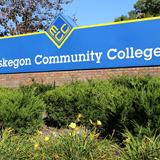- It is the mission of Grand Rapids Community College to provide the community with learning opportunities that enable people to achieve their goals.
School Highlights
Grand Rapids Community College serves 17,294 students (25% of students are full-time).
The college's student:teacher ratio of 21:1 is higher than the state community college average of 19:1.
Minority enrollment is 38% of the student body (majority Hispanic), which is less than the state average of 40%.
Quick Stats (2025)
- Enrollment: 17,294 students
- In-state tuition: $5,931
- Out-state tuition: $8,571
- Student:teacher ratio: 21:1
- Minority enrollment: 38%
- Source: Integrated Postsecondary Education Data System (IPEDS)
Top Rankings
Grand Rapids Community College ranks among the top 20% of public schools in Michigan for:
Category
Attribute
Community Size
Debt For Students
School Overview
The teacher population of 810 teachers has stayed relatively flat over five years.
Grand Rapids Community College
(MI) Community College Avg.
Carnegie Classification
Associate's Colleges: Mixed Transfer/Career & Technical-High Traditional
Baccalaureate/Associate's Colleges: Associate's Dominant
Institution Level
At least 2 but less than 4 years
At least 2 but less than 4 years
Institution Control
Public
Public
Total Faculty
810 staff
224 staff
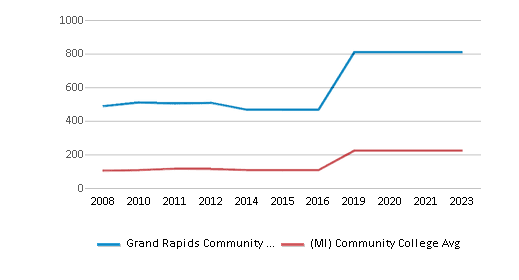
School Calendar
Student Body
The student population of Grand Rapids Community College has grown by 30% over five years.
The student:teacher ratio of 21:1 has increased from 15:1 over five years.
The Grand Rapids Community College diversity score of 0.58 is less than the state average of 0.60. The school's diversity has stayed relatively flat over five years.
Total Enrollment
17,294 students
2,154 students
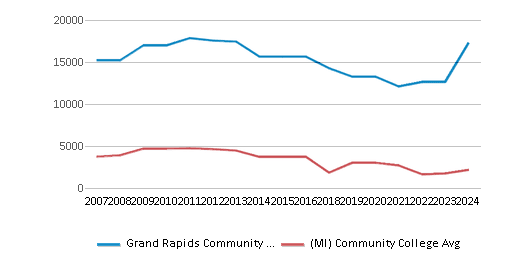
Student : Teacher Ratio
21:1
19:1
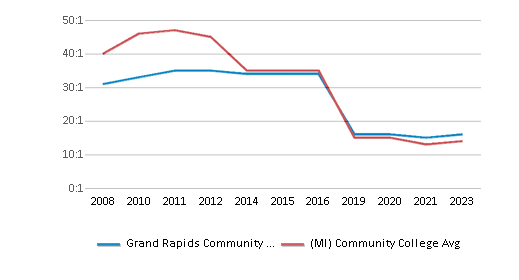
# Full-Time Students
4,301 students
878 students
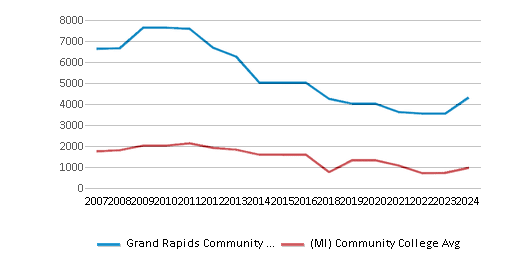
# Part-Time Students
12,993 students
1,714 students
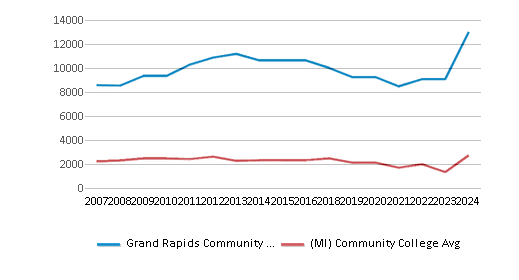
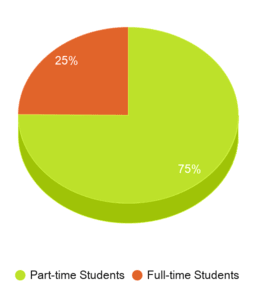
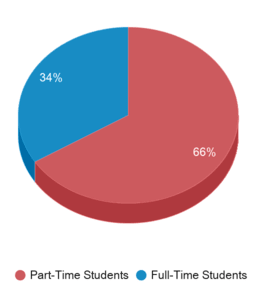
# Enrollment Undergraduate
172 students
225 students
# Full-Time Undergraduate Students
4,301 students
889 students
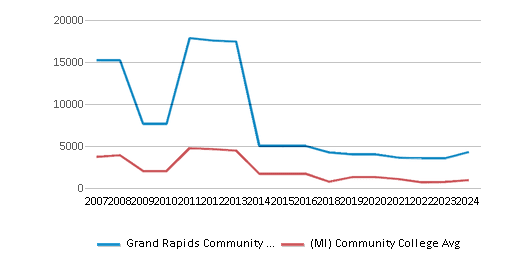
# Full-Time Graduate Students
n/a
4 students
# Part-Time Undergraduate Students
12,993 students
1,714 students
# Part-Time Graduate Students
n/a
4 students
Total Dormitory Capacity
n/a
178 students
% American Indian/Alaskan
1%
n/a
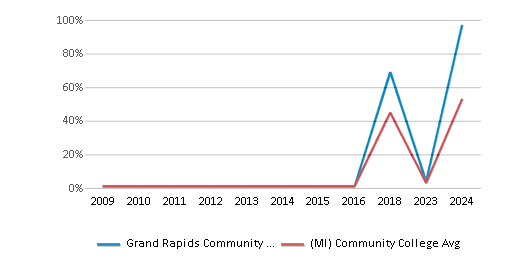
% Asian
4%
4%
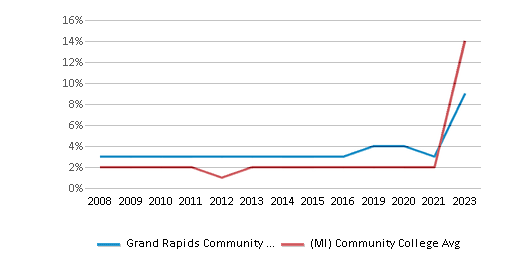
% Hispanic
16%
7%
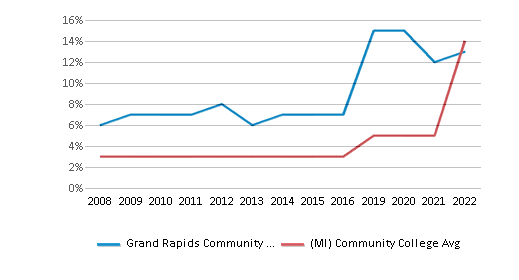
% Black
9%
16%
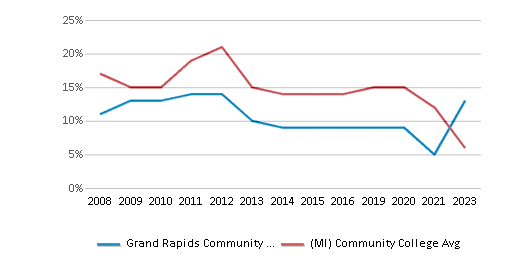
% White
62%
60%
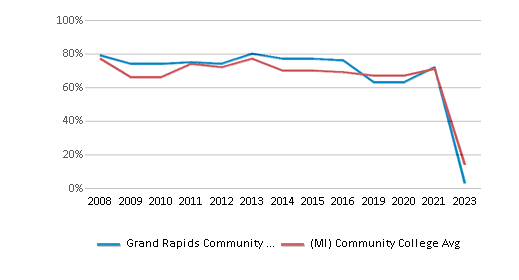
% Hawaiian
n/a
1%
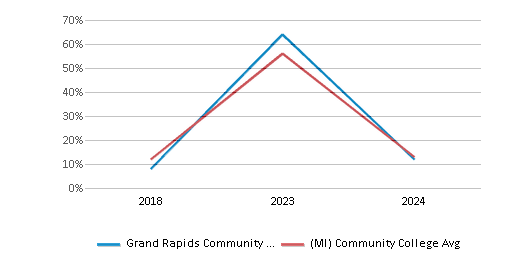
% Two or more races
4%
4%
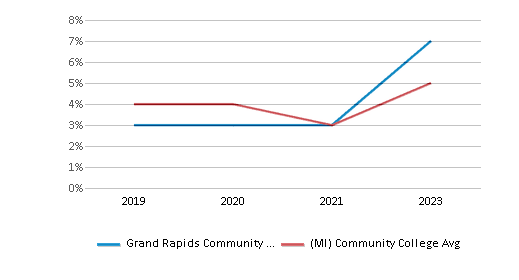
% Non Resident races
n/a
2%
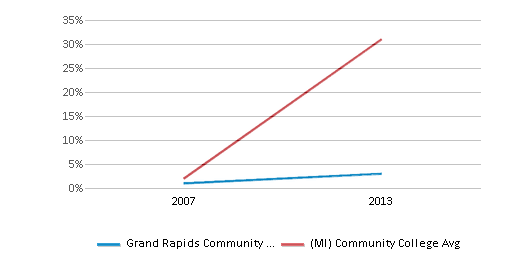
% Unknown races
5%
6%
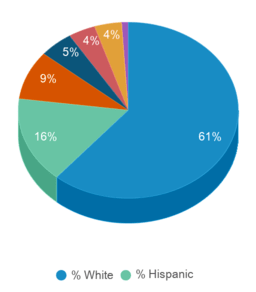
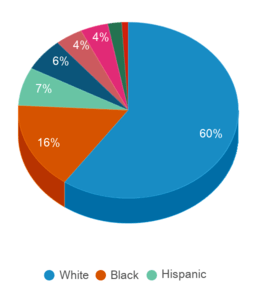
Diversity Score
0.58
0.60
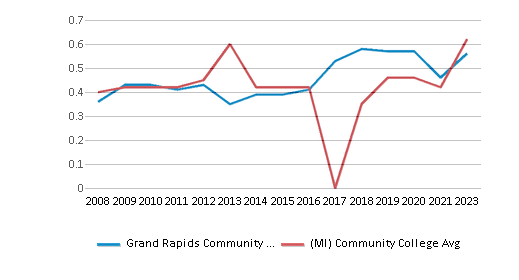
College Completion Rate (Students who graduate in less than 4 years)
0.1854%
0.2881%
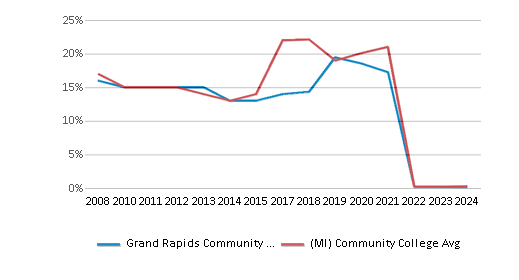
College Completion Rate (Students who graduate in 4 years or more than 4 years)
n/a
0.2071%
Average Graduate Earnings (10 Years)
$32,200
$30,700
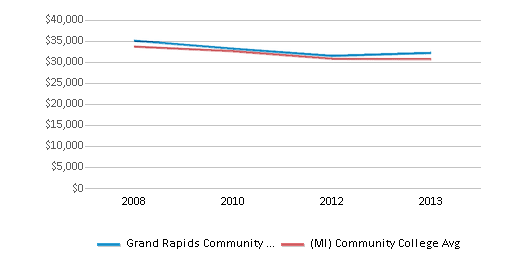
Tuition and Acceptance Rate
The public in-state tuition of $5,931 is more than the state average of $4,952. The in-state tuition has declined by 24% over four years.
The public out-state tuition of $8,571 is more than the state average of $6,896. The out-state tuition has declined by 26% over four years.
In-State Tuition Fees
$5,931
$4,952
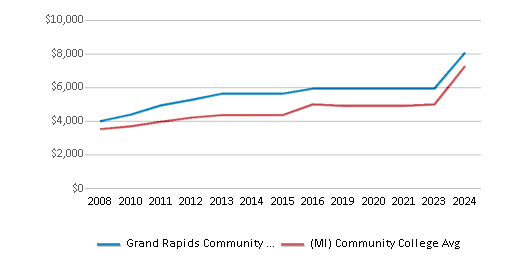
Out-State Tuition Fees
$8,571
$6,896
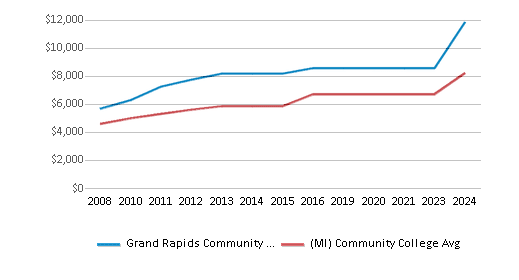
% Students Receiving Some Financial Aid
61%
89%
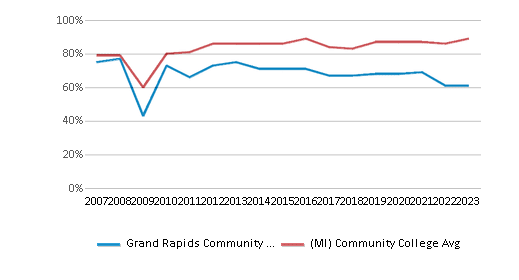
Median Debt for Graduates
$9,650
$11,704
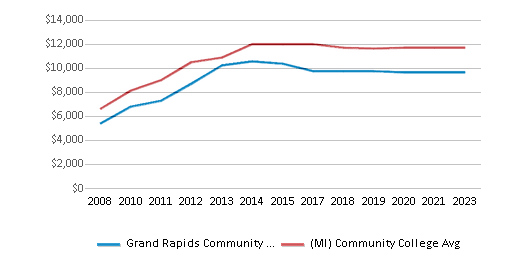
Median Debt for Dropouts
$4,500
$5,500
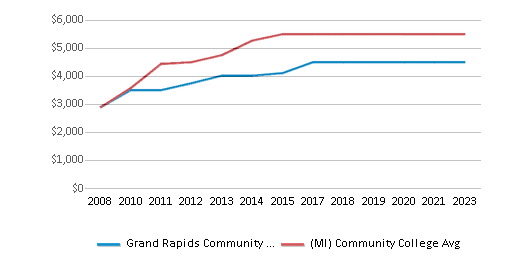
Acceptance Rate
n/a
98%
Source: 2024 (or latest year available) Integrated Postsecondary Education Data System (IPEDS)
School Notes
- Grand Rapids Junior College (GRJC) was founded in 1914 by the Grand Rapids Board of Education after a resolution was passed by the University of Michigan's faculty which encouraged the establishment of junior colleges in Michigan. Today, GRCC's eight-block downtown campus includes several classroom buildings, a learning center and library, Spectrum Theater, the Applied Technology Center, a remodeled music building, a fieldhouse with natatorium, a student center (including the Diversity Learning Center), Bostwick Commons, and the state-of-the-art Calkins Science Center. An off-campus “Learning Corner” has been added to serve the East Hills and Eastown neighborhoods as well as the greater Grand Rapids Community. In addition, GRCC has two Michigan Technical Education Centers (M-TECs ® ) in West Michigan. The Patrick Thompson M-TEC ® , located in Holland, opened in Fall 2000 in partnership with the Ottawa Area Intermediate School District. Its open entry/open exit instruction eliminates the need for students in manufacturing and industry-related occupational programs to conform to a traditional semester time frame. The Leslie E. Tassell M-TEC ® in Grand Rapids opened in 2002. This world-class facility offers training in manufacturing, auto service, and building and construction trades. In Fall 2004, more than 14,000 students enrolled in more than 1,600 liberal arts and occupational courses. The diverse student body represents students from Kent and surrounding counties as well as students from across the U.S. and 22 other nations. Another 10,000 learners are served by non-credit instructional opportunities. In addition to traditional classroom environments, students may also receive instruction through community and distant service-learning offerings, seminars, workshops, training classes, distance learning options and other educational formats. GRCC employs a faculty of more than 250 full-time and 350 part-time members as well as a staff of 650, all of whom are focused on the College's priorities to be student-centered, collaborative, and flexible. Throughout its 90-year history of academic excellence, GRCC has maintained a solid reputation as a premier transfer institution and is nationally recognized for both its liberal arts and occupational programs.
Frequently Asked Questions
How much does Grand Rapids Community College cost?
Grand Rapids Community College's tuition is approximately $5,931 for In-State students and $8,571 for Out-State students.
What is Grand Rapids Community College's ranking?
Grand Rapids Community College ranks among the top 20% of community college in Michigan for: Largest student body and Least debt for graduating students.
In what neighborhood is Grand Rapids Community College located?
Grand Rapids Community College is located in the Downtown neighborhood of Grand Rapids, MI.
Recent Articles

Obtaining Your Bachelor's Degree at a Community College
Explore the evolving landscape of community colleges offering bachelor's degrees, addressing affordability, accessibility, and workforce needs.

A to Z of Community College Certificates and Courses
From business and healthcare to technology and skilled trades, the article showcases the breadth of options available to students seeking to enhance their knowledge, develop new skills, or pursue career advancement.

What is a Community College?
This comprehensive guide explains what a community college is, its history, and its role in higher education. It covers the types of programs offered, differences from four-year colleges, benefits of attending, and important considerations for prospective students, providing valuable insights for those exploring educational options.

